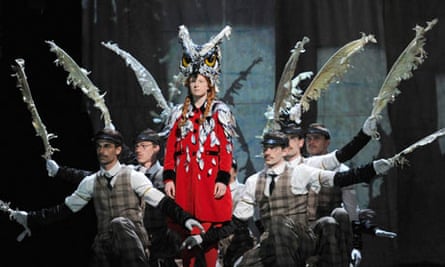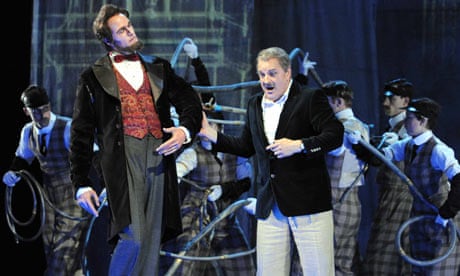Philip Glass began his career as an opera composer with a trilogy of works built around historical figures – Einstein, Gandhi and the Egyptian pharaoh Akhnaten. Further "portrait" operas have followed – about Galileo in 2002 and Kepler in 2009, as well as three works in the 1990s centred on the films of the writer and director Jean Cocteau. Glass's latest stage work to reach Britain is a portrait too, but of a different kind, for the starting point of The Perfect American was a fictionalised account of the last months in the life of Walt Disney, as presented in the novel of the same name by Peter Stephan Jungk.
Rudy Wurlitzer's libretto shuttles backwards and forwards through those final months in 1966, switching between Disney's Los Angeles home and his hospital bed in Burbank, his office and the first Disneyland in Anaheim, and including as well his last visit to his birthplace in Marceline, Missouri. Fact and fiction intermingle, real characters confront imaginary ones in building a portrait of Disney as racist and rabidly rightwing – "Ronnie used to be a democrat," he says of Reagan at one point, "but I talked him out of it" – with a ruthless ambition to dominate the world through his brand of popular culture, proudly boasting to his brother Roy that in Brazil he was "more famous than Santa Claus".

His career-long technique of taking all the credit for the hard work of others, refusing to acknowledge the work of the animators who worked in his studios, is personified in the opera through the (invented) character of William Dantine, a former employee sacked by Disney for his union activities: "You were never an artist," Dantine tells him, "all you are is a moderately successful CEO." But neither those scenes nor one near the end of the opera when Disney strikes up a friendship with the boy in the next hospital room really help to get beneath the surface of what could have been a more convincing piece of music theatre. As it veers between the sentimental and the commonplace, never using one cliche when two would do the job as well, Wurlitzer's text fails to explain the reasons for Disney's astonishing success and, in its determination to present him as a thoroughly unpleasant human being, never bothers to identify what his talents really were.
The dramatic pace is consistently leaden too, and while Glass's music is as finely crafted as ever, its main function is simply to support the narrative in a neutral way, never taking the dramatic initiative or threatening to supply what is so obviously lacking in the work's dramaturgy. Neither does the Improbable production, originally devised by Phelim McDermott for the world premiere in Madrid in January. The Walt Disney Company prohibited any use of iconic Disney images on stage, so though Dan Potra's designs make extensive, busy use of animations and video projections, they leave the audience to translate what they see into the Disney cartoon characters they are meant to replace.

Compared with the outstanding production of Glass's Satyagraha that Improbable staged for ENO in 2007, this is deeply disappointing, and some leaden choreography for a superfluous movement group only adds to the embarrassment. It comes to life dramatically just once, in the Disneyland scene, when Disney confronts a malfunctioning animatronic Abraham Lincoln and likens himself to the great 19th-century liberal.
Christopher Purves plays Disney, carefully mixing charisma and control, yet never creating either a sympathetic or a compelling central character. That's the opera's problem, the lack of anything truly engaging; none of the other roles, including Disney's brother Roy (sung by David Soar), his wife Lillian (Pamela Helen Stephen) and nurse Hazel George (Janis Kelly), are anything more than ciphers, while Gareth Jones's conducting can't add much either.

Comments (…)
Sign in or create your Guardian account to join the discussion